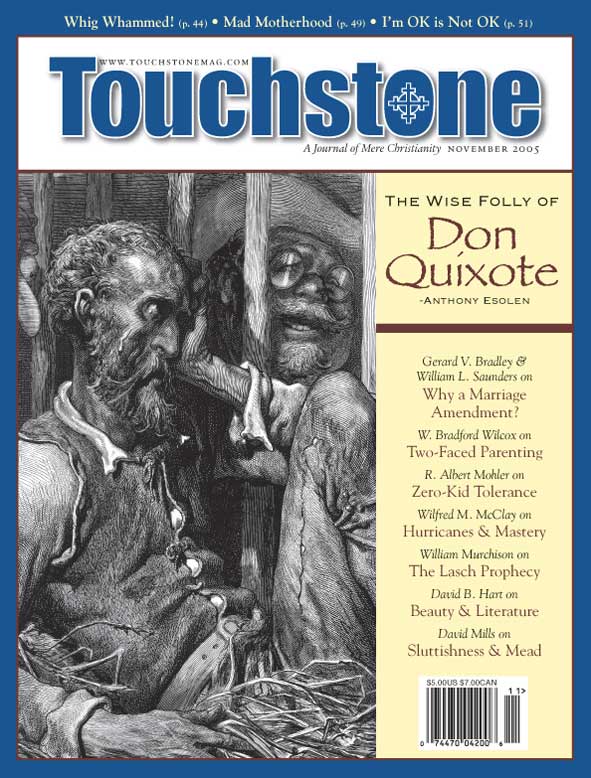Self-Esteem Scheme
One Nation Under Therapy by Christina Hoff Sommers and Sally Satel
One Nation Under Therapy: How the Helping Culture Is Eroding Self-Reliance
St. Martin’s Press, 2005
(310 pages, $23.95, hardcover)
reviewed by Richard Kirk
As the title of this book suggests, for many Americans the republic’s fate rests not in the hands of a supreme deity but on the ministrations of post-traumatic grief brigadiers. Blind faith in proactive intervention has replaced the stoic virtue of self-restraint or the more mundane technique of focusing attention on other matters. Such is the point of view that One Nation Under Therapy was written to refute.
“Therapism” is the derisive term that the authors, social critic Christina Hoff Sommers and Yale psychiatrist Sally Satel, assign to a wide-ranging set of ideas. According to these American Enterprise Institute scholars, therapism “valorizes openness, emotional self-absorption, and the sharing of feelings.”
In addition, it presupposes an “anguished and . . . apprehensive public [that] requires a vast array of therapists, self-esteem educators, grief counselors, workshoppers, healers, and traumatologists to lead it through the trials of everyday life.” The necessity of high self-esteem is its psychological cornerstone.
According to this perspective, children are an especially vulnerable group that requires special protection from the emotional depredations of growing up. Indeed, under the influence of this fragile-ego philosophy, some teachers have consigned the once-popular game of dodgeball to a recreational “Hall of Shame.” In place of aggressive, ball-related activities, this philosophy prefers non-competitive diversions like scarf-juggling—since scarves, as a prominent fitness advocate noted, “are soft, nonthreatening, and float down softly.”
Failing Narcissists
Against these notions, which transform childhood itself into a pathology, Sommers and Satel employ a wealth of material (the book has eighty pages of endnotes) to argue that an overly protective environment where individuals constantly focus on their own feelings, and are expected to feel good about themselves, is counterproductive, both in education and in therapy. For example, Roy Baumeister’s comprehensive review of the topic, published in the May 2003 issue of Psychological Science in the Public Interest, finds that students who give themselves high marks in self-esteem tend to be more narcissistic and combative than those who offer more modest evaluations.
The promotion of self-esteem is not the only area where therapism has intruded into education. The authors tell about an 11-year-old girl whose New York City curriculum encourages her and her classmates to probe “deeply into their experience.”
In perfect compliance with expectation, young Erica composed and read aloud a highly emotional essay in which she expressed profound shame for not having expressed her love to a dying great-grandfather. The manipulative quality of this assignment becomes apparent when one discovers that her grandfather died when she was two years old.
A chapter focused on Abraham Maslow and two of his well-known admirers, Abbie Hoffman and Timothy Leary, serves to elucidate the shaky intellectual foundation upon which therapism rests. Famous as the founder of self-actualization theory, Maslow offered this immodest assessment of his profession’s potential: “I sometimes think that the world will either be saved by psychologists—in the very broadest sense—or it will not be saved at all.”
With this comment he linked a movement grounded in grandiose expectations for individuals with a vision of humanity as a psychological basket case. As sociologist Frank Furedi has noted, the therapeutic relationship (especially as envisioned by humanistic psychology) mirrors this same contradiction: “The very fact that the realization of the self is predicated on a relationship of dependence on therapeutics, calls into question the quality and meaning of individual autonomy.”
Criminal Victims
Theories such as Maslow’s that tout the vast potential of human beings also tend to medicalize the “pathological” behavior of as-yet-unactualized individuals.
In a chapter named “Sin to Syndrome,” Sommers and Satel explore the way criminals and addicts have been reclassified as patients with diseased brains or as victims of social trauma. In this attempt to dispense with personal responsibility, the notion of a “real me”—a well-intentioned phantasm divorced from the tangible agent of destruction—also comes in handy.
Throughout their book, Sommers and Satel criticize therapeutic approaches that undercut the virtue of self-reliance and underestimate human resilience. This tendency is particularly obvious when it comes to treating the poorly defined and over-diagnosed condition of Post-Traumatic Stress Disorder. Instead of aggressive intervention, they argue, “repression” (as “focusing attention on other matters” is loosely labeled) is often a more constructive way to deal with harrowing events.
This point is made embarrassingly clear in the case of foreign refugees who often do quite well by attending to the practical demands of living in a re-arranged world and who largely reject the advice of Western counselors to dwell on the past. Indeed, even post-9/11 New Yorkers did not exhibit fragility in the numbers required to justify hefty traumatological budgets.
Undaunted, committed advocates for mental preemption interpreted this tepid response to widely publicized services as another symptom of illness—thus illustrating the vicious therapistic principle that “people are sick even if they don’t appear to be, and especially if they deny it.”
Despite a degree of topical hopscotching, some redundancy in its final chapters, and a regrettable transference of Richard Nixon’s 1972 presidential landslide to 1968, One Nation Under Therapy does succeed in exposing many of the practical and intellectual absurdities of therapism. As such, it is a welcome contribution to the task of making the country safe, once again, for dodgeball—a goal whose humorousness shouldn’t mask its far-reaching cultural significance.
Richard Kirk is a freelance writer living in southern California whose book Moral Illiteracy: "Who's to Say?" is also available on Kindle.
subscription options
Order
Print/Online Subscription

Get six issues (one year) of Touchstone PLUS full online access including pdf downloads for only $39.95. That's only $3.34 per month!
Order
Online Only
Subscription

Get a one-year full-access subscription to the Touchstone online archives for only $19.95. That's only $1.66 per month!
bulk subscriptions
Order Touchstone subscriptions in bulk and save $10 per sub! Each subscription includes 6 issues of Touchstone plus full online access to touchstonemag.com—including archives, videos, and pdf downloads of recent issues for only $29.95 each! Great for churches or study groups.
Transactions will be processed on a secure server.
more from the online archives

15.6—July/August 2002
Things Hidden Since the Beginning of the World
The Shape of Divine Providence & Human History by James Hitchcock
calling all readers
Please Donate
"There are magazines worth reading but few worth saving . . . Touchstone is just such a magazine."
—Alice von Hildebrand
"Here we do not concede one square millimeter of territory to falsehood, folly, contemporary sentimentality, or fashion. We speak the truth, and let God be our judge. . . . Touchstone is the one committedly Christian conservative journal."
—Anthony Esolen, Touchstone senior editor









